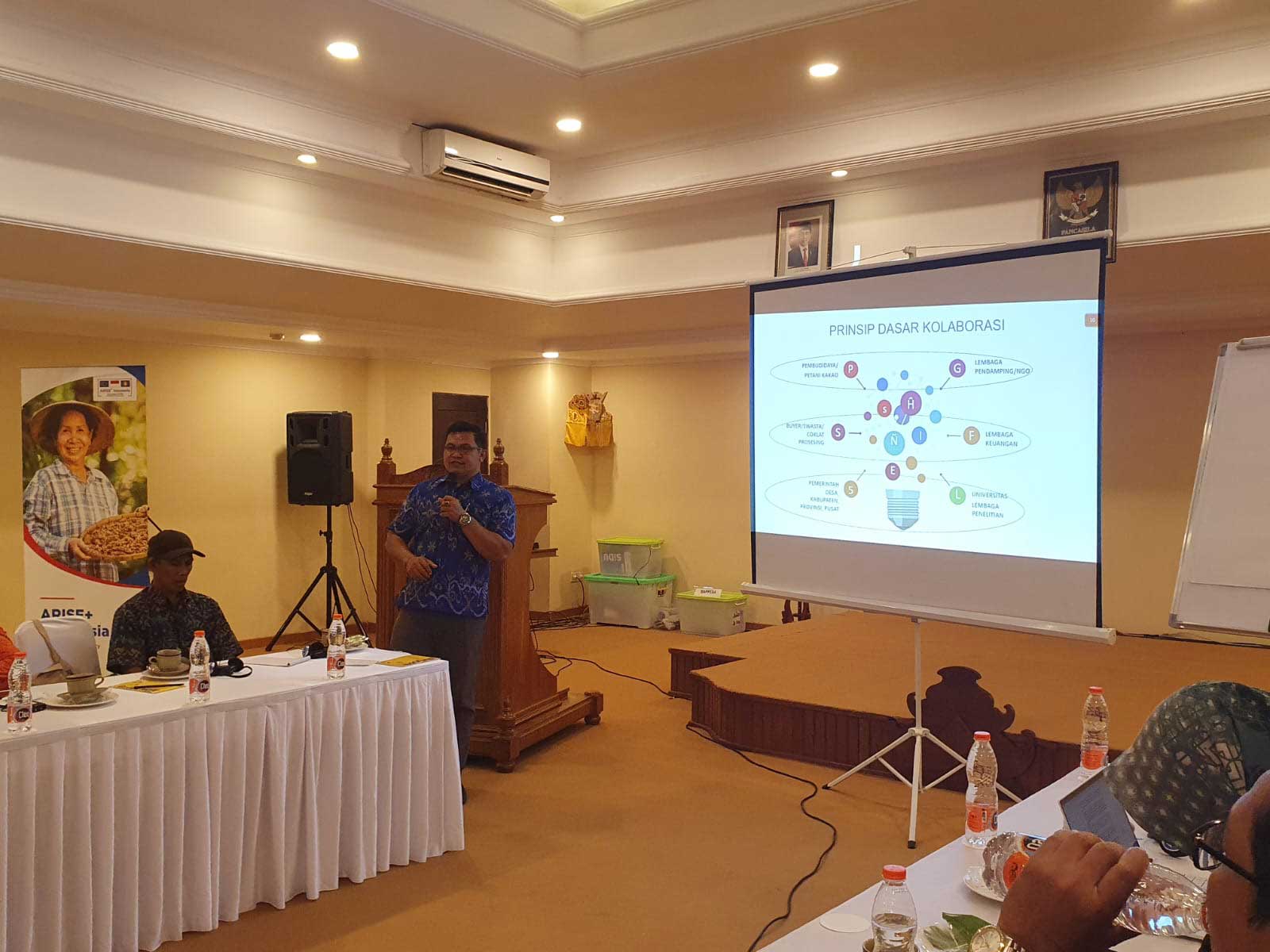Technical Assistance I

The Jembrana Regency, located in the southwestern part of Bali, is known internationally for the high quality of its cacao. Jembrana cacao owes its reputation to a good selection of plant varieties combined with favourable geographical conditions. On top of those, Jembrana farmers apply subak abian, a Balinese indigenous know-how passed on from many generations to manage water for farming. Based on subak abian principles, for example, by adapting the landscape and growing other plants in cacao fields, farmers can optimise water usage, save on the cost of inputs, sustain the natural characteristics of the soil, and obtain a unique flavour and aroma profile.
It is based on those key strengths and the sustainable economic development potential that it represents for the entire regency that Jembrana Cacao Cluster was pre-selected by the government to be one of the beneficiaries of the SME Development Masterplan (Masterplan Pengembangan UKM Indonesia) led by Bappenas and the Ministry of Development of MSMEs and Cooperatives. Bappenas, with support from ARISE+ Indonesia, organised a workshop in Jembrana on 7 March 2023 to discuss the possible pathways to enhance the Jembrana supply chain to global markets, especially Europe.
The workshop was officiated by the Head of the Regency I Nengah Tamba, in the presence of Ahmad Dading Gunadi, Director for the Development of MSMEs and Cooperatives, Bappenas, and Marc Kwai Pun, Team Leader, ARISE+ Indonesia First Technical Assistance Team. A host of experts from the central government, including Bapak William Bere Ati, Senior Advisor, Ministry of Development of MSMEs and Cooperatives, local government and ARISE+ Indonesia. Several prominent members of the Jembrana Cacao Cluster and stakeholders participated in the workshop, including Ketut Wiadnyana, Chairman of the Kerta Samaya Samaniya (KSS) Cooperative and Agung Widiastuti, Director Kalimajari NGO.
Regent I Nengah Tamba envisions cacao to be one of the pillars of the transformation of Jembrana to a major economic zone which would accelerate with the completion of the Denpasar - Gilimanuk in 2026, which will boost connectivity between Bali and Java. “We will continue to expand cacao plantations in all villages so that every family has the opportunity to produce high-quality cacao beans”, he declared.
Director Ahmad Dading Gunadi explained that the SME Development Project aims at increasing the value added that accrues to small farmers and producers. “The project document states that ultimately the majority of value added in the supply chain should stay with the farmers/producers”. One of the means to improve the value added of the cluster is to integrate more transformation processes, which is why Bappenas and the Ministry of Development of MSMEs and Cooperatives have earmarked a grant to enable the cluster to invest in a processing plant.
KSS is envisaging the construction of the factory premises, with the support of the government grant, for grinding cacao beans, producing cocoa liquor and eventually cocoa butter, both being intermediate products for chocolate making. They have been encouraged to undertake this investment after a potential buyer expressed interest in such products.
The ARISE+ Indonesia team presented an overview of the economy of the cocoa sector. It was pointed out that Indonesia’s domestic supply of cacao beans is currently lower than the available grinding capacity, therefore must import beans to fill in the gap. The presentation also explained the importance of observing food safety standards during the transformation processes, explaining the need to design the plant based on such standards and acquire adequate skills. Those factors would be key to take into consideration when assessing the feasibility of the proposed investment.
ARISE+ Indonesia also presented the prototype of a market intelligence website where information on cacao markets, especially in the EU, would be accessible to businesses. The EU would be especially interesting for products that have a Geographical Indications label, as such products generally fetch prices that may be twice as much as generic products.
Information was also provided on the most appropriate terms that the cooperative could apply to export their goods to mitigate risks (for example, to consider using FCA rather than FOB).
Participants actively contributed to the discussions. The Senior Advisor, Ministry of Development of MSMEs and Cooperatives, William Bere Ati, underscored the importance of ensuring that market demand for butter and powder would be sufficient to render the investment profitable. Other local government representatives also stressed the importance of having a distinct team of trained personnel to handle transformation processes as well as maintenance of the equipment. It was also observed that most cocoa farmers have an advanced age and that the industry and the cooperative should not underestimate the need for regeneration by preparing young entrepreneurs for the cocoa business.
The main stakeholders of the cluster acknowledged the wealth of information that has been shared during the discussions, opening new perspectives for the development of the cacao cluster and especially the investment project.




